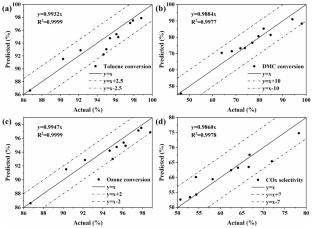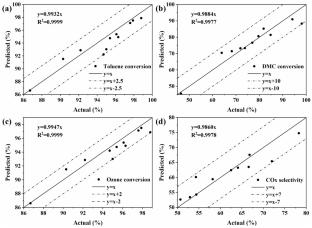Comparative Study on the Effect of Reaction Parameters on Low-temperature Catalytic Ozonation of Single- and Multi-component VOCs Using Response Surface Methodology
Abstract
Recently, ozone catalytic oxidation technology has been widely concerned because it can efficiently remove VOCs at low temperatures. However, the influence of different factors on the catalytic ozonation of VOCs, especially of multi-component VOCs, is still indeterminate. Herein, the effect of each reaction parameter on catalytic ozonation of single- and multi-component of toluene and dimethyl carbonate was systematically evaluated using a highly efficient catalyst (Mn/Y). Simultaneously, a multiple quadratic regression model was established by response surface methodology to compare the difference of the contribution of different reaction conditions to single- and multi-component VOCs reaction systems. It was found that the effect of different factors on VOCs conversion followed reaction temperature > space velocity > input concentration of ozone. In addition, the effect of the reaction conditions on ozone conversion in DMC reaction system and COx selectivity in toluene reaction system (reaction temperature > input concentration of ozone > space velocity) is different from the other reaction systems (reaction temperature > space velocity > input concentration of ozone). Satisfactorily, the results of the catalytic reaction experiment are highly consistent with the data fitted by the multiple quadratic regression model. It can provide theoretical guidance for optimizing the reaction parameters of catalytic ozonation of VOCs in different reaction systems.



 求助内容:
求助内容: 应助结果提醒方式:
应助结果提醒方式:


